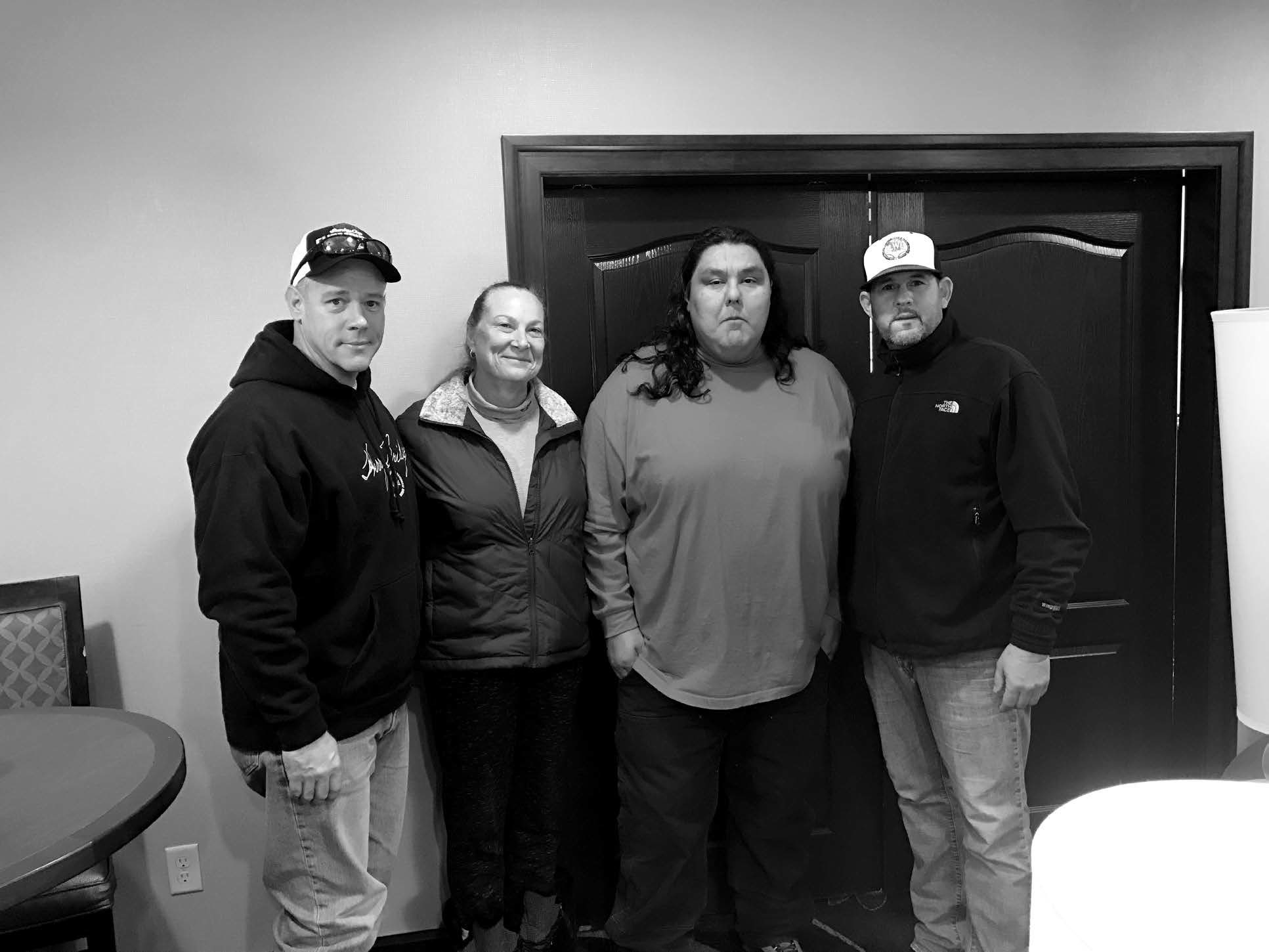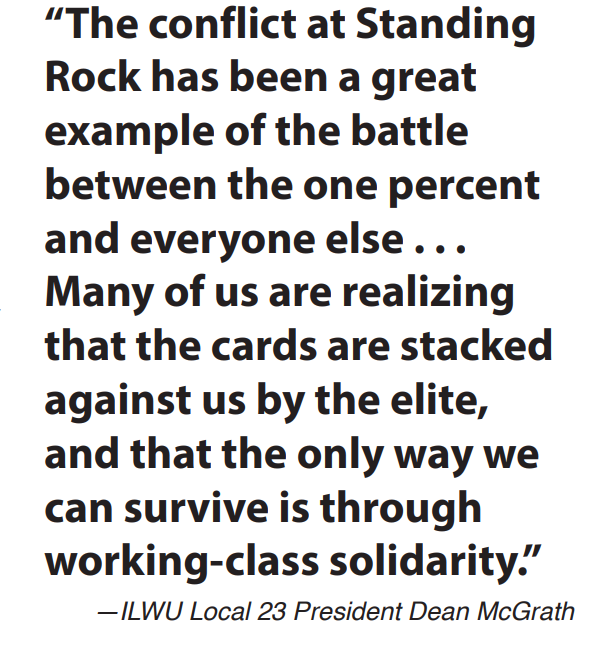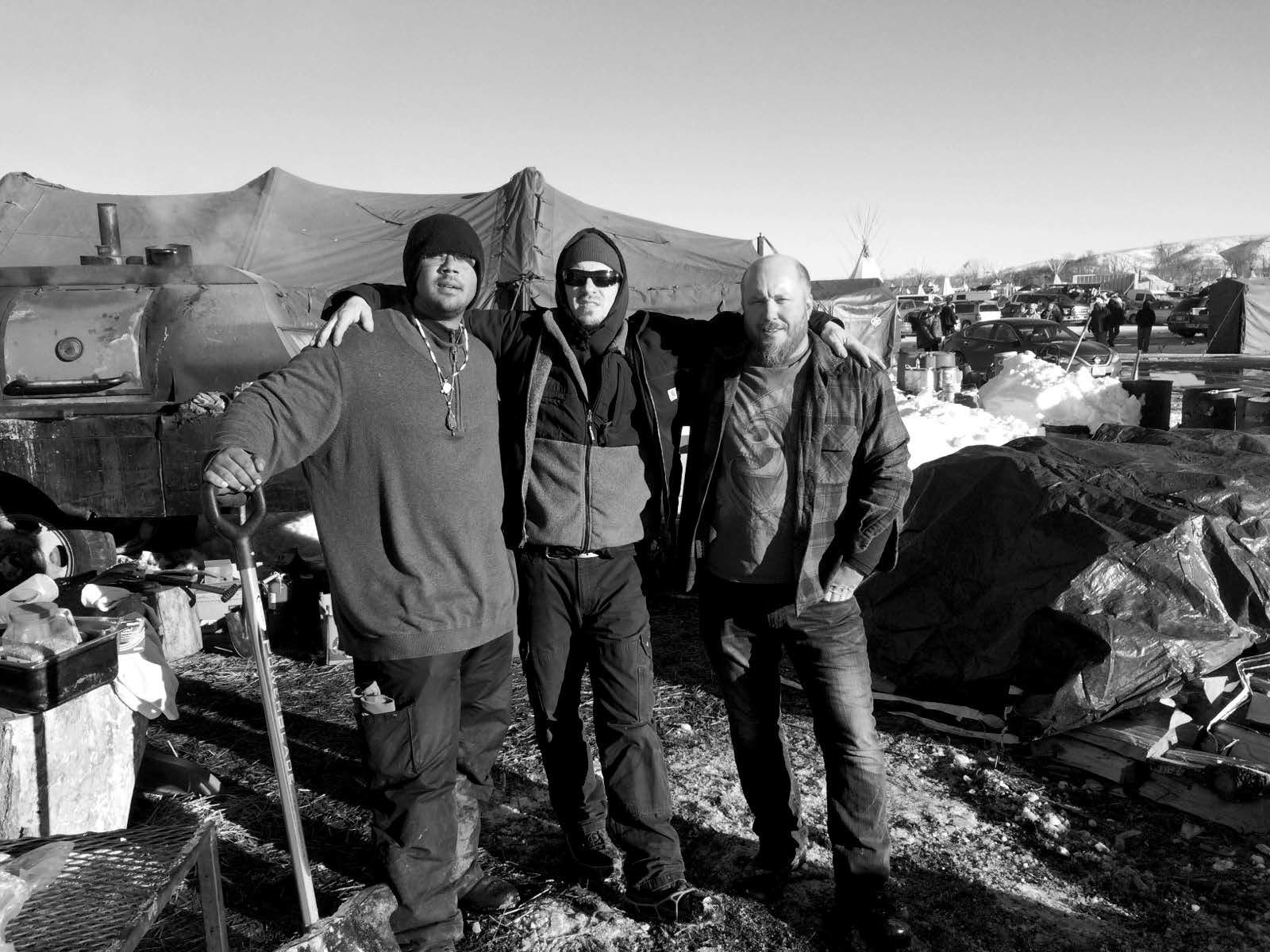On December 6, the ILWU International Executive Board voted unanimously to adopt a statement of policy opposing the Dakota Access Pipeline (DAPL). The controversial project is opposed by Native Americans across the continent because it threatens Native lands and water. The pipeline’s original route would have crossed the Missouri River upstream from Bismarck, North Dakota, but was rerouted because of concerns that an oil leak would contaminate the City’s water supply. Pipeline proponents want the oil to cross just a half-mile upstream from the Standing Rock Sioux Reservation, buried underneath the tribe’s water supply
The ongoing protest by the Standing Rock Sioux Tribe on their North Dakota reservation began in April, 2016. The effort has drawn world-wide attention and attracted thousands of Native American supporters and allies. It has become the largest protest gathering of Native Tribes in recent history.
International Executive Board Statement of Policy
“The Tribal Nations of the Great Plains rely on the waters of the life-giving Missouri River for present and future existence, and the Dakota Access Pipeline construction poses a very serious risk to that continued existence. The Dakota Access Pipeline threatens the safety of the areas of fish and wildlife, sacred sites and historical archeological resources that lie within and around the Standing Rock Sioux Reservation and associated lands,” declares the ILWU Statement of Policy.
The International Executive Board also approved a $10,000 donation to the Standing Rock Sioux from the solidarity fund. The Coast Longshore Committee added an additional $5,000 donation. “The ILWU has never been afraid to take a stand on important political issues,” said ILWU International President Robert McEllrath.
Support for the Standing Rock Sioux was first expressed by the ILWU’s Pacific Coast Pensioners Association that adopted a resolution in September of 2016.
Local 10’s Executive Board then passed a resolution on November 8 against the pipeline project and in support of increased funding for workers affected by any jobs lost on the pipeline. The resolution called on the labor movement to support a “just transition” for workers into renewable energy jobs, to help working families, combat climate change and promote investment in renewable energy.

From left to right: Local 10 President Ed Ferris, International Executive Board member Julie Brady, Jason “Biggie” Umtuch and Local 13 President Bobby Olvera Jr. Umtuch and Oscar High Elk housed ILWU members during their stay at the camp and welcomed them with open arms, said Local 13 delegation member Tim Hernandez.
Labor unions divided
The ILWU is among a number of unions that have pledged support for protests led by the Standing Rock Sioux. The Amalgamated Transit Union, American Postal Workers Union, Communications Workers of America, National Nurses United, Service Employees International Union (SEIU) and the United Electrical Workers have all issued statements supporting the protest. Support has also come from six AFL-CIO constituent groups, including the A. Phillip Randolph Institute, the Asian Pacific American Labor Alliance, and the Coalition of Black Trade Unionists.
However, last September, the AFL-CIO issued a statement supporting the pipeline project, thought to be the result of pressure from the Building Trades Department. The Building Trades issued a letter to their membership that sharply criticized unions who have opposed the pipeline project.
ILWU delegations lend a hand
Local 4 members Steve Hunt, Jamison Roberts and Josh Goodwin were the first ILWU members on the ground in Standing Rock in November of 2016. They drove 3,000 miles round trip to deliver over $7,000 worth of supplies to the camp. Hunt said he decided to go after seeing media video of protesters being attacked by private security guards and he wanted to see first-hand what was happening.
“I wanted to know the truth,” Hunt said. “When we were locked out of the grain elevators in Washington, I saw the tactics used by private security, police, and the military. I know they aren’t there to protect the green grass. They have the backs of the oil companies. It reminded me of the grain lockout when the Coast Guard would just push us out of the way when they wanted to bring a ship in.”
When word got out that Hunt was planning a trip to Standing Rock, donations from Local 4 members started rolling in. Hunt said he had to take a larger truck and rent a trailer to fit all of the donated gear, food and toiletries. Hunt financed the trip out of his own pocket, but at a recent meeting, Local 4 members voted to reimburse him for expenses.
A delegation from ILWU Local 23 went to Standing Rock just after the Thanksgiving holiday to deliver $6,000 in donated supplies. The delegation included Local 23 President Dean McGrath, Local 23 members Theresa Sammalisto and Brendan Winders and Local 23 casual Brian Skiffington.
McGrath said that “solidarity was the one word that sums up the vibe at the Standing Rock encampment.” He met people there from all over the world who came together to brave the harsh North Dakota winter to provide support for the Standing Rock Sioux Tribe who are fighting to protect their land and way of life.

“The conflict at Standing Rock has been a great example of the battle between the one percent and everyone else,” McGrath said. “The concern of the Standing Rock Sioux for the water on their land has been met with violent attacks by private security and police. Hundreds of thousands of taxpayer dollars are being spent to protect the interests of the pipeline company. Many of us are realizing that the cards are stacked against us by the elite, and that the only way we can survive is through workingclass solidarity.”
Delegations from Locals 10 and 13 arrived in the beginning of December, just after the International Executive Board passed its Statement of Policy.
“Despite enduring long periods of subzero weather and violence at the hands of law enforcement, the brothers and sisters at ‘Oceti Oyate’ (the People’s Camp) are all in. They are firmly resolved in effort and purpose to protect their land and their water supply,” said Local 10 President Ed Ferris.
“I was inspired by the courage, kindness, and solidarity that I witnessed at Oceti Oyate. It was an experience that I will never forget.” Ferris added, “I am very proud of our union for putting significant resources and boots on the ground to support this struggle. By doing so, we have honored the ILWU’s rich tradition of fighting for social justice. We have honored our slogan ‘An injury to one, is an injury to all.’ ”

Solidarity at the Standing Rock encampment: (L-r) Isaiah Barnes of the Sioux Nation with Jamison Roberts and Steve Hunt of ILWU Local 4.
“It was an extremely humbling experience,” said ILWU Local 13 President Bobby Olvera Jr. Olvera was inspired by the teamwork by all ILWU members from different locals who stepped-up to do whatever jobs were needed to assist the Sioux. “Everyone pulled their weight. There were no titles there. We were all lending our hands to build structures or whatever tasks were needed. The ILWU has always taken stands on social issues going back to Harry’s day. With Trump coming into office, we are going to need even more of this,” Olvera said.
Tim Hernandez is a registered Class B longshore worker from Local 13 who was a part of the Local 13 delegation to Standing Rock. Hernandez, who is Lakota, was an important part of the ILWU team. His knowledge of the culture and language helped to strengthen the ties between the ILWU delegations and the Standing Rock Sioux and to help teach the ILWU delegations the proper protocols of being on sacred lands, Hernandez said.
“It was a blessing to be able to return home for the first time,” Hernandez said. “I’m not from Standing Rock, I’m from Pine Ridge, but we are a part of the Lakota Nation, and we are relatives. I knew it would be a life changing experience and that the ancestors would be present. The Seventh Generation—my generation—is experiencing an awakening. We need to take care of the earth and fight for all life.”
End game unclear
President Obama’s administration reviewed the pipeline project and determined that the company should re-route the project in order to protect the tribe’s water supply and sacred sites. And on December 6, Standing Rock Sioux Chairman Dave Archambault asked supporters to leave the encampment due to dangerous blizzards that would continue to pose a hazard throughout the winter
On January 24, 2017, President Donald Trump signed executive memorandums to push construction of both the DAPL and the Keystone XL pipeline. The DAPL action calls for expedited approvals, including for rights-of-way and permits, and withdrawal of the intent to conduct a full environmental assessment. Standing Rock Sioux and allies have denounced the administration’s decision.
